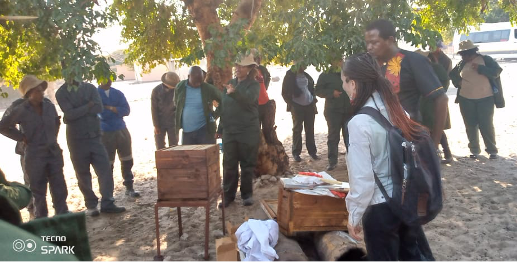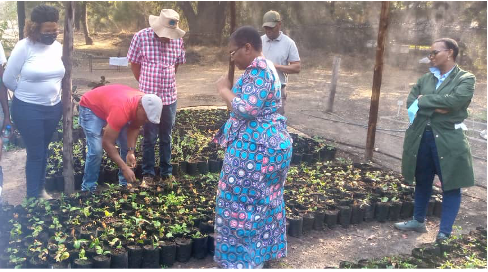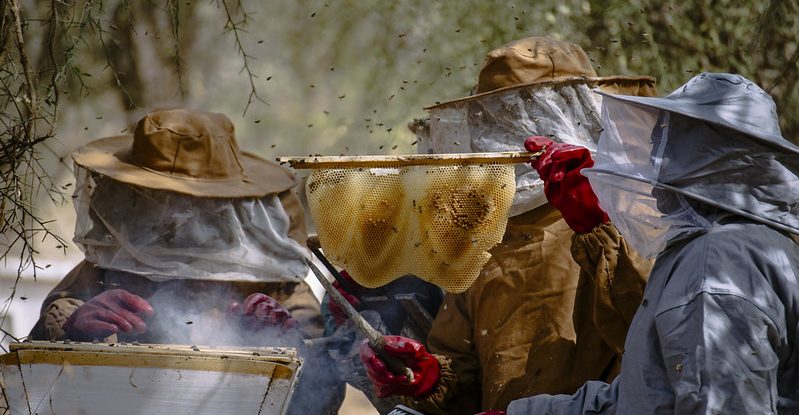Agroforestry has been widely heralded as critical to making food systems more sustainable and adaptable in the context of climate change and the food and biodiversity crises.
In Botswana, these crises are already hitting hard. With 70 percent of the country’s territory stretching over the Kalahari Desert, its climate is mostly arid and semi-arid, and global warming is making its already-hot summers hotter, with rainfall becoming more scarce and variable and droughts more frequent.
Meanwhile, the livestock population has grown dramatically, prompting degradation and desertification in many key rangeland areas and compromising livelihoods and food security along the way.
In this context, Botswana’s National Forest Master Plan for 2021-2039 names agroforestry as a key element of adaptation and sustainable transition. The next steps, of course, are to work out how it might apply in context to protect and restore tree cover while supporting incomes and diets.
In line with this plan, the Center for International Forestry Research and World Agroforestry (CIFOR-ICRAF) is implementing a year-long agroforestry programme in Shaikarawe Community in the country’s Northwest District.
To help build capacity to implement the programme, CIFOR-ICRAF held a five-day training workshop from 24–28 July 2023 at Tokadi Conference Centre in Shakawe Northwest District.
Thirty-four government officers from ten districts participated in the training, alongside 20 local farmers connected to the Shaikarawe Community Trust. Joyce Njoloma, an associate scientist at CIFOR-ICRAF and associate professor at Lilongwe University of Agriculture and Natural Resources, and Christopher Katema, a senior scaling-up officer at CIFOR-ICRAF, co-led the event.
The training sought to equip participants with knowledge and skills on agroforestry practices and beekeeping as a forest-based enterprise. It covered content on tree nursery establishment and management; establishment and management of fertiliser, fodder, and fruit trees; beekeeping management and production; and land restoration.

Christopher Katema of CIFOR-ICRAF (third from from right) trains participants in beekeeping at Shaikarawe Community. Photo: A. Setso/JAFTA.
Bees are a valuable element of many agroforestry systems because they take up little space and pollinate a wide variety of crops, whilst producing honey that can be eaten, used medicinally as an anti-bacterial, anti-inflammatory, and antioxidant agent, or sold for income.
Mothusi Selaledi, the national coordinator of Botswana’s Department of Forestry and Range Resources (DFRR), said that the training took place at an appropriate time for the inclusion of agroforestry technologies in the implementation of the Botswana Forest Master Plan.
“These technologies and practices are required to enhance availability of fodder for livestock, improve soil fertility, restore degraded landscapes, and for climate change mitigation and adaptation,” he said.
George Mahindi, the chairperson of Shaikarawe Community Trust, shared that the Trust is the first of its kind to venture into agroforestry through on-farm learning as a means to improve income and food security in the community. “Shaikarawe Community will be the first to sell honey in the community and towns in the northwest district,” he said. “We expect to begin to do so next year.”

CIFOR-ICRAF’s Joyce Njoloma (centre) leads a session on tree nursery seedling management at Shakawe Department of Forestry and Range Resources (DFRR) Office. Photo: A. Setso/JAFTA
Acknowledgements
CIFOR-ICRAF is implementing this year-long agroforestry programme in Botswana’s Northern Districts with support from the Japan Forest Technology Association (JAFTA) through Japan’s International Cooperation Agency (JICA).
We want you to share Forests News content, which is licensed under Creative Commons Attribution-NonCommercial-ShareAlike 4.0 International (CC BY-NC-SA 4.0). This means you are free to redistribute our material for non-commercial purposes. All we ask is that you give Forests News appropriate credit and link to the original Forests News content, indicate if changes were made, and distribute your contributions under the same Creative Commons license. You must notify Forests News if you repost, reprint or reuse our materials by contacting forestsnews@cifor-icraf.org.
